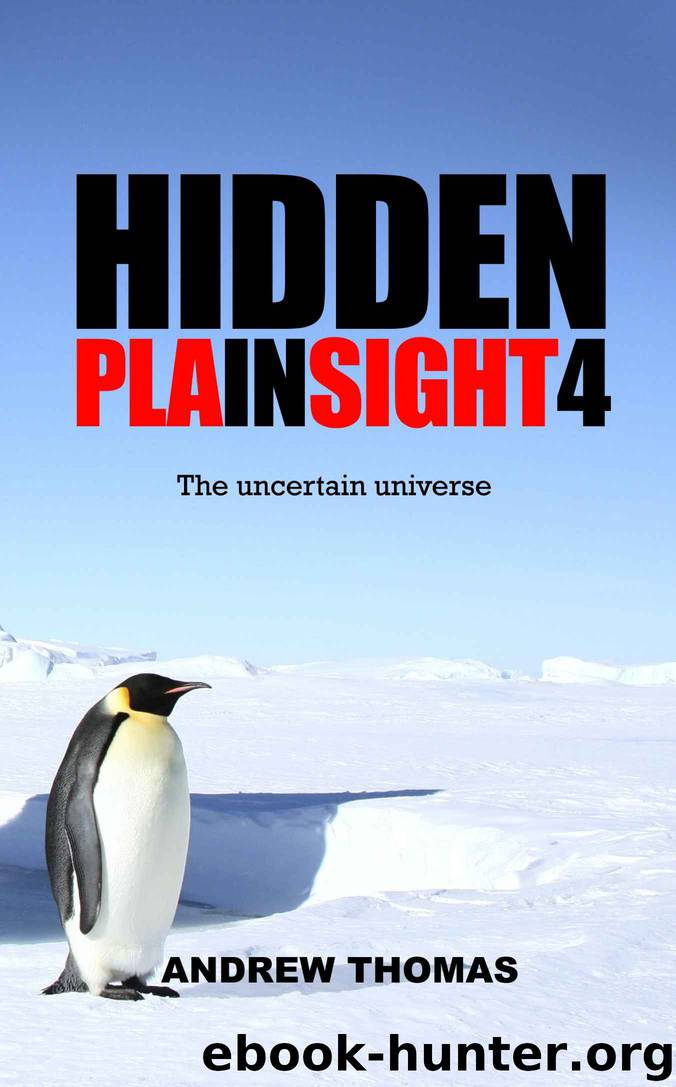Hidden in Plain Sight 4: The Uncertain Universe by Dr. Andrew H. Thomas

Author:Dr. Andrew H. Thomas [Thomas, Andrew H.]
Language: eng
Format: epub
ISBN: 9781507616123
Amazon: 1507616120
Publisher: CreateSpace Independent Publishing Platform
Published: 2015-01-29T00:00:00+00:00
Gödel and physics
It is often said that mathematics is the "language of Nature", with mathematics proving to be an uncanny match to the laws of physics. Indeed, discoveries in mathematics sometimes anticipate corresponding discoveries in physics (the most recent example of this being the discovery of the Higgs boson — after its existence was predicted by mathematical reasoning back in 1964). Bearing this in mind, we might reasonably ask the question as to whether Gödel's incompleteness theorem has some corresponding equivalent in the laws of physics? Does uncertainty in mathematics lead to a corresponding uncertainty in physics?
This is not an unreasonable question because it is already known that the incompleteness theorem has implications for computing. The British mathematician Alan Turing showed that there were certain mathematical problems which could not be solved by a computer. The principle behind these so called uncomputable problems was directly analogous to the incompleteness theorem.
So, if the universe can be considered as behaving like a computer, then the incompleteness theorem clearly has implications for its behaviour. In his book Pi in the Sky, John Barrow compares the operation of the universe to the processing of a computer, saying that there is: "The image of the universe as a great computer program, whose software consists of the laws of Nature which run on a hardware composed of the elementary particles of Nature."
If the universe really can be considered as being a form of computer, then the laws of mathematics should certainly apply to all its processes. However, in his book Gödel, Escher, Bach, Douglas Hofstadter compares the universe with a formal system of mathematics and realises the following: "Can all of reality be turned into a formal system? One could suggest, for instance, that reality is itself nothing but one very complicated formal system. Its symbols do not move around on paper, but rather in a three-dimensional vacuum (space); they are the elementary particles of which everything is composed. The 'typographical rules' are the laws of physics. So the theorems of this grand formal system are the possible configurations of particles at different times in the history of the universe. The sole axiom was the original configuration of all the particles at the beginning of time. However, quantum mechanics casts at least some doubts on even the theoretical worth of this idea. Basically, we are asking if the universe operates deterministically."
As we have discussed in the previous chapter, quantum mechanics reveals that — at the core of reality — there lies fundamental indeterminism and uncertainty. So, as Hofstadter suggests, it would appear that the functioning of the universe can never resemble the predictable processing of a digital computer.
However, in his 2002 lecture entitled Gödel and the End of Physics, Stephen Hawking presented the following insight: "In the standard approach to the philosophy of science, physical theories live rent free in a Platonic heaven of ideal mathematical models. That is, a model can be arbitrarily detailed and can contain an arbitrary amount of information without affecting the universes they describe.
Download
This site does not store any files on its server. We only index and link to content provided by other sites. Please contact the content providers to delete copyright contents if any and email us, we'll remove relevant links or contents immediately.
The Complete Stick Figure Physics Tutorials by Allen Sarah(7361)
Secrets of Antigravity Propulsion: Tesla, UFOs, and Classified Aerospace Technology by Ph.D. Paul A. Laviolette(5364)
Thing Explainer by Randall Munroe(3930)
The River of Consciousness by Oliver Sacks(3598)
The Order of Time by Carlo Rovelli(3183)
How To by Randall Munroe(3101)
A Brief History of Time by Stephen Hawking(3021)
I Live in the Future & Here's How It Works by Nick Bilton(2990)
What If?: Serious Scientific Answers to Absurd Hypothetical Questions by Randall Munroe(2694)
The Great Unknown by Marcus du Sautoy(2687)
Midnight in Chernobyl by Adam Higginbotham(2540)
Blockchain: Ultimate Step By Step Guide To Understanding Blockchain Technology, Bitcoin Creation, and the future of Money (Novice to Expert) by Keizer Söze(2481)
Networks: An Introduction by Newman Mark(2403)
The Meaning of it All by Richard Feynman(2343)
Easy Electronics by Charles Platt(2325)
The Tao of Physics by Fritjof Capra(2266)
Midnight in Chernobyl: The Untold Story of the World's Greatest Nuclear Disaster by Adam Higginbotham(2218)
Introducing Relativity by Bruce Bassett(2114)
When by Daniel H Pink(2112)
